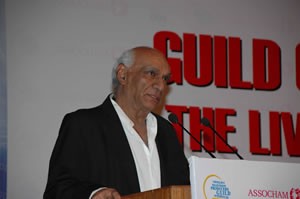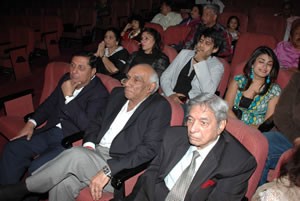ROMANTIC FILMS CAN ALSO CARRY SOCIAL MESSAGES: YASH CHOPRA
ROMANTIC FILMS CAN ALSO CARRY SOCIAL MESSAGES: YASH CHOPRA
by
B B Nagpal
Senior Film Critic
NEW DELHI, APRIL: Filmmaker Yash Chopra has strongly defended his brand of cinema saying that he does not show mere commercial romanticism but infuses a lot of meaningful content into it.
Speaking on the sidelines of a festival of films by his elder brother B R Chopra, he said that it was erroneous to say that his films did not have the kind of social commitment that one saw in the films of his brother.
While noting that he had got his first break as a director in his brother’s ‘Dhool ka Phool’, he said he was entitled to make his own kind of cinema.
Paying a tribute to his brother, he said Baldev Raj Chopra was probably the only filmmaker in India who had never made any compromises and gone ahead and made the kinds of films he wanted irrespective of their commercial outcome.
The cinematic tribute from 18 to 20 April with nine masterpieces from the BR stable were part of ‘Guild Greats’, an initiative of the Film and Television Producers Guild of India . Co-organised by ASSOCHAM, was sponsored by Time Broadband Services Group’s ‘My Time’ to kick-start the announcement of qualitative IPTV service launch in India through empowering technology and compelling content.
Yash Chopra recalled how his brother had proved wrong filmmakers at the time who felt films on themes like widow re-marriage, rehabilitation of prostitutes, or a court room drama sans songs would never be able to woo audiences.
Speaking at the inauguration and a discussion on the second day, BR’s son Ravi said his father has always been a man of principles who has continued to make films that he felt committed about, irrespective of the financial returns. BR is a ‘karmayogi’ who firmly believes in the motto of BR Films from the Mahabharata which says one must do one’s duty without worrying about the consequences. Ravi said he would not dare re-make any of his father’s films because he could never bring out the finesse they contained, and stressed that the message in his father’s films came out in a subtle manner without the film turning into a documentary.
The filmmaker’s son-in-law and Guild Vice President Raj Tilak, who is an eminent filmmaker in his own right, said showing films of BR Chopra meant celebrating excellence.
Amit Dev who is Chairman of the ASSOCHAM Committee on Convergence said though India had the largest entertainment industry in the world, it global share was not very high. He said the Guild and ASSOCHAM had come together on a single platform and the offshoot was creation of a Content Licensing Centre. He announced another festival of Dr Chopra’s films would be held later in the year.
Ms Sujata Dev, Managing Director of Time Broadband, said the launch of IPTV (Internet Protocal Television) on TV sets, computers and mobiles would make TV more interactive, and help to fight piracy and empower content protection. TIME is preparing to shortly launch IPTV over both Mobile and Broadband in India , through collaboration with recently licensed progressive telecom operators; under the brand of “MY TIME” content package.
Music maestro Ravi recalled several incidents to show how Dr Chopra had given him complete freedom in the way he composed his music. He also spoke of the rapport he had always shared with Dr Chopra and recalled an incident where several people in the fraternity had asked the filmmaker to get the music of ‘Nikaah’ done by some other music director saying Ravi would not be able to do justice, but Dr Chopra had not paid heed.
Basu Chatterjee echoed this when he said Dr Chopra had never interfered with the way he made his films for the BR banner. He said he had not many producers who gave so much freedom to their directors.
Senior Film Critic Pradeep Sardana said the issues raised by the BR banner were today being debated and were as fresh as ever. For example, the film ‘Nikaah’ had raised issues that were being discussed in courts of law today.
Eminent film scribe B B Nagpal recalled social themes dealt with by Dr Chopra in several films made almost fifty years earlier. He said issues like widow re-marriage (dealt both in ‘Ek hi Raasta’ and the more recent ‘Babul’, rehabilitation of a prostitute (‘Sadhna’) and questioning the laws of rape and divorce (‘Insaaf ka Taraazu’ and ‘Nikaah’ respectively) were still relevant and some filmmakers were now attempting to make films on these themes, though not with as much success.
Filmmaker Ms Savita Oberoi said she had learnt a lot from interacting with Dr Chopra. She referred to the freedom he and his son Ravi had given to her when she made her hour-long film on B R Chopra as part of her six-film series on Dadasaheb Phalke Awardees. Excerpts from the film were screened after the discussion on the second day, while an in-house film on Dr Chopra was shown at the inauguration.
Members of the Chopra family included Ravi Chopra’s wife, Ravi ’s two sisters and their husbands, Ravi ’s son Abhay, and his daughter and son-in-law.
The festival opened with ‘Insaaf Ka Tarazu’ (1980), and other films screened were: Hamraaz (1967), Waqt (1965), Ittefaq (1969), Baghban (2003), Gumraah (1963), Nikaah (1982), Naya Daur (1957), and Chhoti Si Baat (1976).

